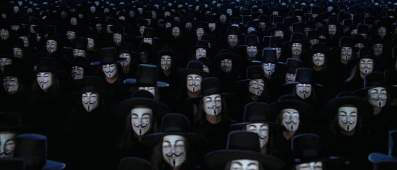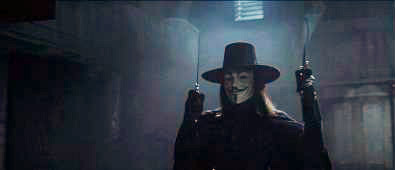"The
hero is a terrorist. And it's a very good ethical point
because,
as we all know, one man's terrorist is another
man's freedom fighter." |
Stephen Fry |
Would
it be such a stretch of the imagination to say that V
for Vendetta was
one of the most eagerly anticipated movies of the last few
years? The works of respected graphic novel author Alan
Moore haven't fared very well in the past. 2001's From
Hell
– a dark, period piece – was praised for its setting and
quality of acting, but suffered from a weak plot, while
in 2003, The League of
Extraordinary Gentlemen was a box-office flop and
a disappointment all around.
V,
for the most part, managed to shake off its predecessors'
bad reputations. This could be partially attributed to the
presence of producer Joel Silver and cult directors the
Wachowski Brothers, aka the team behind the hugely popular
The Matrix and its enjoyable but underwhelming sequels.
Filmgoers may have been too keen to think "It's by the creators
of The Matrix, so it must be good!", a
phenomenon usually reserved for Quentin Tarantino and M.
Night Shyamalan; film companies are quick to plaster Tarantino
or Shyamalan's name all over anything they had a hand in,
hoping for sales by association.

Of
course, I'm not implying that this was the only reason for
its generally-favourable release period. The film itself
is a terrific one, as both myself and Camus attested to
in our respective reviews earlier in the year; it boasts
action and anarchy in equal measure, and while it does drag
slightly in the middle, makes up for it with its fantastic
pyrotechnic effects. Watching the film on DVD (released
31st July) obviously can't compare to the cinema experience,
but overall, V translates to the small screen well
enough.
Critical
reaction to the film, however, was more lukewarm than anticipated.
The right-wing Daily Mail opened with the byline "V
for Vendetta? More like Z for ZZZZ"; the Evening
Standard complained that the Wachowski's script was unnecessarily
verbose; The Guardian called it "boring" and "unexciting".
On the other end of the scale, The Mirror commended the
film's cast, effects and plotlines, and the legendary Roger
Ebert praised its ideas, plotlines and characterisations.
With
the notable aforementioned exception of the Guardian, it
seemed from my usual skim of the papers that the more conservative,
right-wing papers seemed to come down the hardest on the
film, whereas the liberal, left-wing papers were the ones
more willing to keep an open mind and gave it more favourable
reviews. This is a theory that I'd supported ever since
the release of the film – as the film's plot centres around
the overthrowing of a corrupt government headed by a right-wing
dictator, right-wing newspapers (and their readers) will
be aversed to the idea and thus come out strongly against
it, while the ones more in favour of this style of social
reform will be more inclined to support V's (essentially
terrorist) actions. While I'm certainly not saying that
anyone who hates this movie wants to see a police state
and dictator in power, objective viewers may have drawn
the same comparison.
Something
I noticed that irked some reviewers was the way the film
encourages the viewer to sympathise with a man who is, essentially,
a terrorist. Claims were made that the film was "inciting
anarchy" and "supporting terrorism" – personally, I think
that these reviewers should learn to distinguish fantasy
from reality, but that's neither here nor there. Yes, the
film appears to encourage acts of rebellion against the
government, but it's intended both as a moral message and
as a warning, and not as an incitement to riot.

On
the other end of the critical spectrum, the comic book fans'
reaction was half-expected: compared to the graphic novel,
the film didn't rate highly. Fans complained that it had
dumbed down the original intent of the book, and that the
romantic subplot between V and Evey had been forced and
unnecessary (it not being present in the original). Like
all movies based on books, the film was largely viewed in
the context of its source material, something I feel is
unfair – films should be judged on their own merit, and
not by the standards of whatever came before them. Indeed,
the majority of comic book fans who had not read
the graphic novel came out in favour of the film. It seems
that to fully appreciate this film, you must watch it before
reading its source graphic novel, or risk having your enjoyment
of it marred by needless comparisons.
To
talk at length about the film for a second time is unnecessary;
I invite you to read the original cinematic reviews written
earlier in the year, my myself and Camus:
Warner
Home Video has released V for Vendetta
in both single and double-disc editions. This is a common
practice with Hollywood blockbusters – it allows hardened
filmgoers to purchase the two-disc version with more special
features, while popcorn-munchers just interested in a night's
entertainment can buy the less-expensive one-disc version.
Unfortunately, we were sent the one-disc edition by Warner
– considering that other online review outlets and magazines
were given the two-disc version, I can't help but feel a
little cheated.
Framed
2.35:1 and anamorphically enhanced, the transfer is as you'd
expect from a modern Hollywood feature and close to pristine.
Detail is excellent, colour reproduction very impressive
and contrast is very pleasing. Particularly good are the
night-time rooftop scenes, which have a genuine filmic quality
to them.
The
5.1 soundtrack is also very good, with reasonable use of
the saound stage, especially by the score and some of the
sound effects. Lower frequences are not as active as you
might expect, but make their maek when they are used.
The
single-disc edition of the movie includes one special feature:
"Freedom!
Forever!: Making V For Vendetta
All too often, "Making Of" special features are designed
with TV audiences in mind, especially for big blockbusters.
This is because one of the TV networks will snap up the
rights to a Making Of featurette, and broadcast it within
a few days of the film's cinematic release. Not so with V for Vendetta – this feature is far too
in-depth to appeal to couch potatos, focusing almost exclusively
on what the producers and directors thought about the graphic
novel and how it was translated to the screen.
In
fact, this featurette is less of a "Making Of" and more
of a "What We Think It Means" – aside from behind-the-scenes
stunt shots played in the background, nobody talks about
how the film was made – only the concepts behind
it. Actors Natalie Portman, Hugo Weaving, Stephen Fry, John
Hurt and Stephen Rea are brought in to dissect the plot
and motives of the movie, but none of them really talk about
their own characters, preferring instead to make general
remarks about V and Evey. For their part, director James
McTeigue and producer Joel Silver say a little bit more
about how they needed to "filmize" the graphic novel, and
some of the challenges present in Alan Moore's original
story.
All
in all, the feature is a frustration – the viewer is given
a comprehensive look on the philosophy of V, but is left
wanting to know how the scenes were filmed and how the action
was shot. This aspect of the production isn't even touched
upon in the special features that were held back for the
two-disc edition.
Speaking
of which, the two-disc edition is (for now) exclusive to
HMV customers, and contains the "Freedom! Forever!" feature
plus four others:
"Designing
the Near Future" – the process of creating the
dystopian world of V for Vendetta.
"Remember,
Remember: Guy Fawkes and the Gunpowder Plot"
– a history lesson for those unfamiliar with the story.
England
Prevails: V for Vendetta and the New Wave in Comics
– a look at the real-world concepts behind the original
story.
Cat
Power Montage – a musical montage of scenes from
the film.
To
summarise, the DVD compilation is good, but not exemplary.
V for Vendetta is still just as enjoyable
and watchable on the small screen as it was on the big screen
– after all, the medium (in this case) isn't the
message; it's all about the ideas of the story and its protagonist.
And, as V might have said, ideas transcend the media.
|